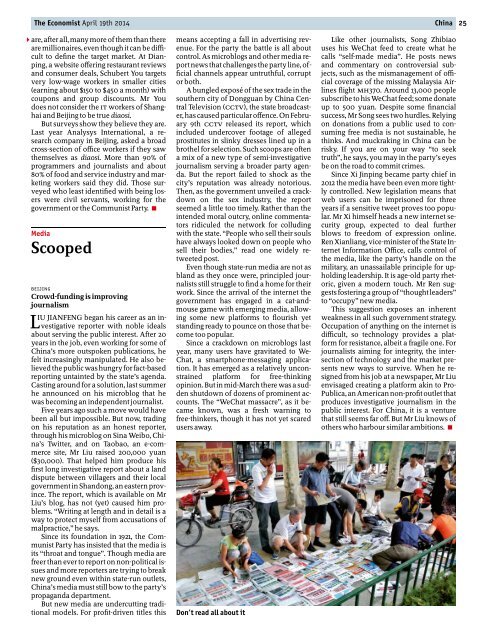The Economist - 19_25 April 2014
The Economist - 19_25 April 2014
The Economist - 19_25 April 2014
- No tags were found...
Create successful ePaper yourself
Turn your PDF publications into a flip-book with our unique Google optimized e-Paper software.
<strong>The</strong> <strong>Economist</strong> <strong>April</strong> <strong>19</strong>th <strong>2014</strong> China <strong>25</strong>2 are, afterall, manymore ofthem than thereare millionaires, even though itcan be difficultto define the target market. At Dianping,a website offering restaurant reviewsand consumer deals, Schubert You targetsvery low-wage workers in smaller cities(earning about $150 to $450 a month) withcoupons and group discounts. Mr Youdoes not consider the IT workers of Shanghaiand Beijing to be true diaosi.But surveys show they believe they are.Last year Analysys International, a researchcompany in Beijing, asked a broadcross-section of office workers if they sawthemselves as diaosi. More than 90% ofprogrammers and journalists and about80% of food and service industry and marketingworkers said they did. Those surveyedwho least identified with being loserswere civil servants, working for thegovernment or the Communist Party. 7MediaScoopedBEIJINGCrowd-funding is improvingjournalismLIU JIANFENG began his career as an investigativereporter with noble idealsabout serving the public interest. After 20years in the job, even working for some ofChina’s more outspoken publications, hefelt increasingly manipulated. He also believedthe public was hungryforfact-basedreporting untainted by the state’s agenda.Casting around for a solution, last summerhe announced on his microblog that hewas becoming an independent journalist.Five years ago such a move would havebeen all but impossible. But now, tradingon his reputation as an honest reporter,through his microblog on Sina Weibo, China’sTwitter, and on Taobao, an e-commercesite, Mr Liu raised 200,000 yuan($30,000). That helped him produce hisfirst long investigative report about a landdispute between villagers and their localgovernment in Shandong, an eastern province.<strong>The</strong> report, which is available on MrLiu’s blog, has not (yet) caused him problems.“Writing at length and in detail is away to protect myself from accusations ofmalpractice,” he says.Since its foundation in <strong>19</strong>21, the CommunistParty has insisted that the media isits “throat and tongue”. Though media arefreer than ever to report on non-political issuesand more reporters are trying to breaknew ground even within state-run outlets,China’s media must still bow to the party’spropaganda department.But new media are undercutting traditionalmodels. For profit-driven titles thismeans accepting a fall in advertising revenue.For the party the battle is all aboutcontrol. As microblogs and other media reportnews that challenges the party line, officialchannels appear untruthful, corruptor both.A bungled exposé ofthe sex trade in thesouthern city of Dongguan by China CentralTelevision (CCTV), the state broadcaster,has caused particularoffence. On February9th CCTV released its report, whichincluded undercover footage of allegedprostitutes in slinky dresses lined up in abrothel for selection. Such scoops are oftena mix of a new type of semi-investigativejournalism serving a broader party agenda.But the report failed to shock as thecity’s reputation was already notorious.<strong>The</strong>n, as the government unveiled a crackdownon the sex industry, the reportseemed a little too timely. Rather than theintended moral outcry, online commentatorsridiculed the network for colludingwith the state. “People who sell their soulshave always looked down on people whosell their bodies,” read one widely retweetedpost.Even though state-run media are not asbland as they once were, principled journalistsstill struggle to find a home for theirwork. Since the arrival of the internet thegovernment has engaged in a cat-andmousegame with emerging media, allowingsome new platforms to flourish yetstanding ready to pounce on those that becometoo popular.Since a crackdown on microblogs lastyear, many users have gravitated to We-Chat, a smartphone-messaging application.It has emerged as a relatively unconstrainedplatform for free-thinkingopinion. But in mid-March there was a suddenshutdown of dozens of prominent accounts.<strong>The</strong> “WeChat massacre”, as it becameknown, was a fresh warning tofree-thinkers, though it has not yet scaredusers away.Don’t read all about itLike other journalists, Song Zhibiaouses his WeChat feed to create what hecalls “self-made media”. He posts newsand commentary on controversial subjects,such as the mismanagement of officialcoverage of the missing Malaysia Airlinesflight MH370. Around 13,000 peoplesubscribe to his WeChat feed; some donateup to 500 yuan. Despite some financialsuccess, Mr Song sees two hurdles. Relyingon donations from a public used to consumingfree media is not sustainable, hethinks. And muckraking in China can berisky. If you are on your way “to seektruth”, he says, you may in the party’s eyesbe on the road to commit crimes.Since Xi Jinping became party chief in2012 the media have been even more tightlycontrolled. New legislation means thatweb users can be imprisoned for threeyears if a sensitive tweet proves too popular.Mr Xi himself heads a new internet securitygroup, expected to deal furtherblows to freedom of expression online.Ren Xianliang, vice-ministerofthe State InternetInformation Office, calls control ofthe media, like the party’s handle on themilitary, an unassailable principle for upholdingleadership. It is age-old party rhetoric,given a modern touch. Mr Ren suggestsfosteringa group of“thought leaders”to “occupy” new media.This suggestion exposes an inherentweakness in all such government strategy.Occupation of anything on the internet isdifficult, so technology provides a platformfor resistance, albeit a fragile one. Forjournalists aiming for integrity, the intersectionof technology and the market presentsnew ways to survive. When he resignedfrom his job at a newspaper, Mr Liuenvisaged creating a platform akin to Pro-Publica, an American non-profitoutlet thatproduces investigative journalism in thepublic interest. For China, it is a venturethat still seems far off. But Mr Liu knows ofothers who harbour similar ambitions. 7


